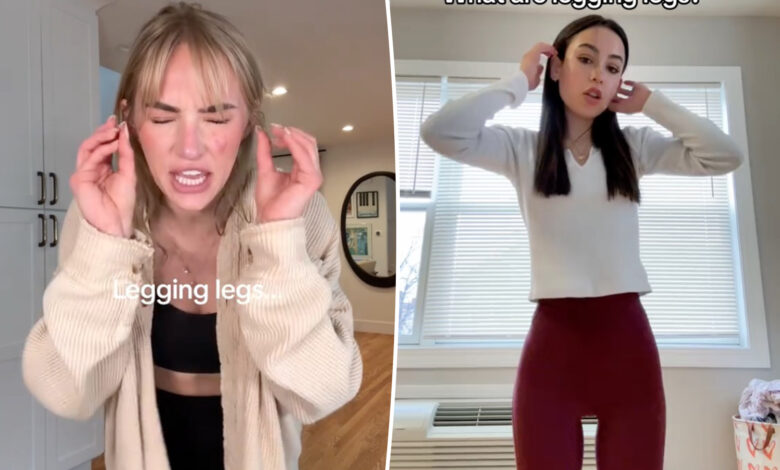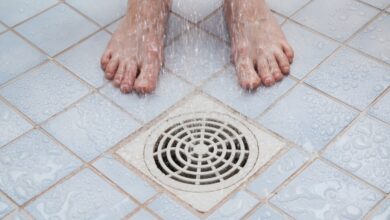TikTok bans toxic legging legs trend after wide spread backlash

TikTok has cracked down on a “toxic” new trend after mass backlash from users over its perpetuation of unrealistic and damaging body standards.
Hashtagged “legging legs,” it consists of young girls declaring they don’t have legs that look “good” in a pair of athletic tights.
The trend, which first became popular late last year, perpetuates the idea that one singular body type and look is ideal – misinforming and potentially harming impressionable and vulnerable young minds.
Multiple publications overseas report the social media platform has now banned the hashtag, so that users who attempt to find videos of it are now shown information about disordered eating instead.
A TikTok Australia spokesperson confirmed to news.com.au that “when people search for #legginglegs or content related to eating disorders, they are shown a pop-up with a link to the Butterfly Foundation”.
“TikTok is an inclusive and body-positive environment and we do not allow content that depicts, promotes, normalizes or glorifies eating disorders.”
Older women, recognizing “legging legs” as the repackaging of toxic body image ideals from their own youth, have condemned the trend, with therapist Holly Essler calling it “repulsing.”
“Basically it’s a trend saying that if you have leggings and you wear leggings, your legs have to look a certain way in them,” she said in a video.
“Again, this is disgusting. Do not let social media tell your body that it is a trend. If you have a body and you have leggings, you have legging legs.”
Another TikTok user, @emilyxpearl, questioned in a video if “we understand what we are doing to the younger generation of women”.
“Do we understand that there are 15-year-old girls that wear leggings every single day that now feel that they cannot wear leggings because they don’t have legging legs … the most stupid thing I’ve ever heard in my life,” she said.
“Do you understand that because of your video telling some little girl that she doesn’t have legging legs, she now feels that she can’t fit into society?”
Australia’s own Steph Claire Smith slammed the movement as “disappointing” and “toxic.”
“I remember being obsessed with having a thigh gap. I remember it driving me insane, being angry at my genetics, basically, and losing anything that I had on my legs just to have a friggin’ gap because social media told me that that was what was attractive,” the model and fitness entrepreneur said.
“And now there is a trend: legging legs. If you have legs, and you’ve got a pair of leggings on, you’ve got legging legs.
“Don’t worry what the internet is freaking saying. I am so, so done, so done, with these stupid trends that are so, so toxic and so damaging.”
A recent survey by Australian eating disorder support and treatment service, the Butterfly Foundation, found that almost half of 12 to 18 year olds feel dissatisfied with their body because of social media.
Dozens of studies in recent years have also found a disturbing association between Instagram and TikTok use and body dissatisfaction and eating disorders.
Head of communication and engagement at the Butterfly Foundation, Melissa Wilton, said it’s “vital that we combat this rhetoric and encourage people to see themselves as a whole being, rather than just their appearance and body size”.
“These appearance-based trends on social media can be extremely dangerous as they portray a very narrow ideal of beauty and suggest that the perfect body exists, while also enforcing the belief that your appearance or body is what makes you worthy,” Ms Wilton told news.com.au.
“Research shows that the more a person internalises these unrealistic body and appearance ideals, the more likely they are to experience body dissatisfaction which can lead to the development of disordered eating and eating disorders.”
Developing social media literacy, she added, is “key” to making apps like TikTok or Instagram “a positive space for users, reducing the risk of developing or exacerbating an eating disorder or body image issue and improving resilience and wellbeing”.
“The power is in your hands – you can block or report distressing content and accounts, take regular breaks from scrolling … and fill feeds with positivity by following accounts that align with your own passions, hobbies, or interests outside of the realm of body appearance.
“If it is your friends that are posting this harmful content, and you don’t want to hurt their feelings by unfollowing them, use the ‘mute’ feature so you don’t see their content – they won’t be notified.”




